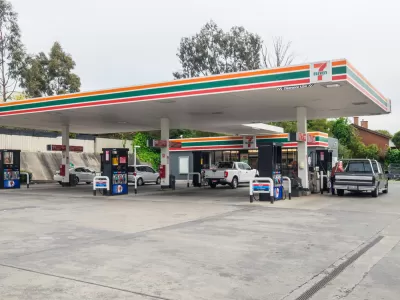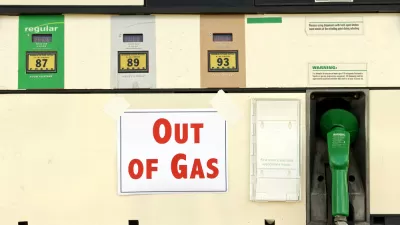Already California, Indiana, Montana, South Carolina (overriding a governor's veto), Tennessee, and Utah* have raised gas taxes this year, while last year was a drought—only New Jersey increased its gas tax.

Planetizen listed 11 states that increased gas taxes in 2015. In 2013, seven states hiked gas taxes, according to the Institute on Taxation and Economic Policy (ITEP).
"The intervening even-numbered years saw less activity, perhaps owing to shorter legislative sessions in some states and re-election concerns," reports Sean Slone for The Council of State Governments. "But transportation policy analysts are confident this year won’t buck the odd-number year trend for a simple reason: It’s time."
Re-election may be the most important factor as illustrated by Monday's post on potential voter backlash expected in the Golden State illustrates, with one state senator already the subject of a recall due to his vote in support of legislation to hike gas taxes by 12-cents per gallon.
Slone extensively quotes Carl Davis, research director at the Institute on Taxation and Economic Policy (ITEP) and a recognized expert on state gas tax legislation.
"A large group of states have been procrastinating on updating their gas tax rates for years or even decades, so there’s a lot of catching up to do in order to restore the purchasing power of the gas tax back where it used to be,” said Davis. “We’ve seen the amount of construction and maintenance that can be funded through the gas tax reduced significantly both because construction has become more expensive and because cars have become more fuel efficient.”
Davis adds that unless gas tax increases include an adjustment for inflation, the increase won't be sustainable due to increasing construction costs. In a January ITEP paper, he elaborates on the need for a “variable-rate” design as opposed to one using a fixed-rate. Joung Lee, policy director for the American Association of State Highway and Transportation Officials, or AASHTO, notes that Georgia added an adjustment for fuel efficiency as well as inflation in its gas tax formula.
In addition to gas tax increases, other fees such as those exclusively for electric vehicles (EVs), which pay no gas tax, and even fees on hybrid vehicles which do pay gas taxes, have been approved. California added a new, sliding-scale vehicle license fee called a transportation improvement fee based on the value of the vehicle that could play a significant factor in the 2018 elections. It was an increase of the existing vehicle license fee that was a significant factor that led to the successful 2003 recall of former Gov. Gray Davis and election of Gov. Arnold Schwarzenegger.
States to watch
Planetizen has reported on possible increases in state gas taxes in Louisiana, Oklahoma and New Mexico and Wisconsin this year.
- The effort to hike the Louisiana gas tax will likely have to wait till 2021 "at the earliest," according to The Advocate.
- As of mid-May, a gas tax increase still seemed possible in Oklahoma, according to KFOR-TV.
- The Democratic-controlled New Mexico legislature approved a gas tax increase only to be vetoed by Republican Gov. Susana Martinez.
- No update for Wisconsin, where Republicans, which control both chambers, back a plan to add sales taxes to fuel sales, but is opposed by Democrats due to regressive changes to the income tax. Gov. Scott Walker opposes hiking the gas tax.
Gas prices are at a 12-year low, and it's an odd-numbered low. It would be a lost opportunity for states not to attempt to hike gas taxes to pay for needed transportation funding.
*Correspondent's note: According to Carl Davis, Utah enacted legislation that will "result in a roughly 0.6-cent-per-gallon tax increase in 2019 and a 1.2-cent increase in 2020."
Hat tip to AASHTO Daily Transportation Update.
FULL STORY: Fueling Transportation Revenues

Planetizen Federal Action Tracker
A weekly monitor of how Trump’s orders and actions are impacting planners and planning in America.

Maui's Vacation Rental Debate Turns Ugly
Verbal attacks, misinformation campaigns and fistfights plague a high-stakes debate to convert thousands of vacation rentals into long-term housing.

San Francisco Suspends Traffic Calming Amidst Record Deaths
Citing “a challenging fiscal landscape,” the city will cease the program on the heels of 42 traffic deaths, including 24 pedestrians.

Defunct Pittsburgh Power Plant to Become Residential Tower
A decommissioned steam heat plant will be redeveloped into almost 100 affordable housing units.

Trump Prompts Restructuring of Transportation Research Board in “Unprecedented Overreach”
The TRB has eliminated more than half of its committees including those focused on climate, equity, and cities.

Amtrak Rolls Out New Orleans to Alabama “Mardi Gras” Train
The new service will operate morning and evening departures between Mobile and New Orleans.
Urban Design for Planners 1: Software Tools
This six-course series explores essential urban design concepts using open source software and equips planners with the tools they need to participate fully in the urban design process.
Planning for Universal Design
Learn the tools for implementing Universal Design in planning regulations.
Heyer Gruel & Associates PA
JM Goldson LLC
Custer County Colorado
City of Camden Redevelopment Agency
City of Astoria
Transportation Research & Education Center (TREC) at Portland State University
Jefferson Parish Government
Camden Redevelopment Agency
City of Claremont





























